Witness for the Prosecution (1957)
Country USA
Director Billy Wilder
Screenplay Billy Wilder, Harry Kurnitz, adaptation by Larry Marcus; based on the play by Agatha Christie
Running time 114 mins | Black & white
Witness for the Prosecution is a classic courtroom drama based on the play by Agatha Christie and, arguably, the best screen adaptation of any of her works.
Charles Laughton plays renowned British barrister Sir Wilfrid Robarts. Robarts is returning home from hospital, having recently suffered a heart attack. As a result, he has been assigned a strict nurse, Miss Plimsoll (Elsa Lanchester), and an even stricter diet outlawing alcohol, cigars and almost any excitement. Unfortunately, that includes avoiding taking on any major criminal cases. From now on he must limit his workload and restrict himself to divorce proceedings and minor civil cases.
When a solicitor colleague, Mr Mayhew (Henry Daniell), comes to see him with a new client, Sir Wilfrid must of course refuse the case. But, seeing the chance to secretly nab a cigar from Mayhew while his nurse isn't looking, he agrees to see him and his client on the pretext of providing some informal advice.
Mayhew's client is Leonard Vole (Tyrone Power), a would-be inventor who has struggled to hold down a job since the war ended and is now unemployed. His money troubles, though, have recently ended, because a wealthy widow has left him £80,000 in her will. Unfortunately, the widow died because she was murdered in her own home and Vole is now the prime suspect, as well as the chief beneficiary. His alibi can only be corroborated by his own wife Christine (Marlene Dietrich). She is the sole person to confirm his story that he returned home before the time that the victim was killed.
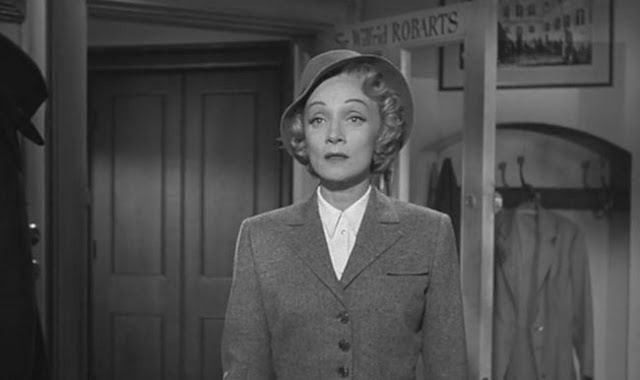 |
| Marlene Dietrich as Christine Vole |
Believing in Vole's innocence, while also attracted to the challenge of defending him, Sir Wilfrid inevitably finds himself drawn in to take on the case. Given that the death penalty is still in force in England, Sir Wilfrid losing the case will also mean Leonard Vole losing his life.
But Sir Wilfrid is not reassured when he meets Vole's surprisingly self-assured wife Christine, who seems to contradict elements of her husband's story. Suspicious both of Christine and her motives, Sir Wilfrid resolves not to put her on the witness stand. But how else can he defend Vole and save him from the hangman?
Witness for the Prosecution is based on Agatha Christie's popular 1953 stage play of the same name. The play had originally started life as a short story called Traitor's Hands before Christie herself had adapted it for the stage.
The 1957 film version was directed and co-written (with Harry Kurnitz and with an adaptation credit for Larry Marcus) by Billy Wilder. Wilder might seem like an unlikely choice for this material, but his usual cynicism and his interest in deception and deceit are all on display here. So too is his sense of humour, which is his and his co-writers' principal addition to the Agatha Christie play.
Although often associated with comedy - especially later works like Some Like it Hot (1959), The Apartment (1960), The Fortune Cookie (1966) and The Front Page (1974) - Wilder had also long shown an interest in the dramatic too. His earlier films included wartime thrillers like Five Graves to Cairo (1943) and Stalag 17 (1953) and film noir stories of twisted relationships and criminal complicity, as seen in Sunset Boulevard (1950) and Double Indemnity (1944). There are elements of Witness for the Prosecution that are reminiscent of some of those earlier films, particularly Sunset Boulevard and Wilder's post-war satire A Foreign Affair (1948).
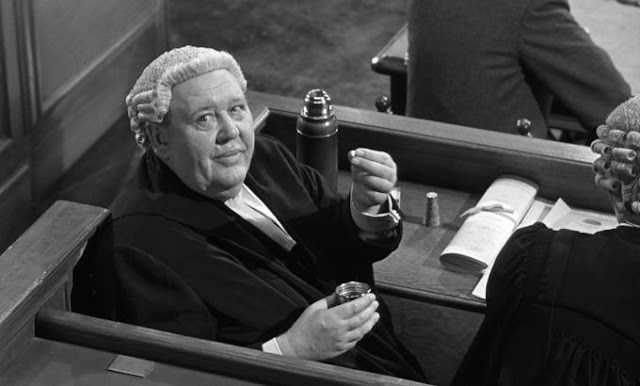 |
| Sir Wilfrid Robarts (Charles Laughton) in court with his flask and pills |
Wilder and Harry Kurnitz flesh out Agatha Christie's story a little, moving it away from the courtroom at times and including a flashback sequence set in post-war Germany. Wilder always believed in the importance of plot and the primacy of the screenplay, and what Agatha Christie provides the film with is her careful plotting and story twists. Wilder and Kurnitz have kept the shape of the Christie story, while adding character touches and plenty of wit, most of it of the dry kind.
Although it is successfully opened out from the stage play, the courtroom remains the focus of the film, with Wilder embracing the natural drama and theatre of a criminal trial. The film is intelligently adapted from the play, with interest maintained throughout by the use of flashbacks, by a comic subplot involving Sir Wilfrid and his nurse, and by Wilder's employment of a mobile camera to avoid any hint of staginess.
The film's principal star, Charles Laughton, is on especially good form as the grouchy Sir Wilfrid Robarts, bringing intelligence and humour to the part. Laughton makes the character irascible, commanding and wonderfully droll. He is consistently engaging and entertaining in this role, whether it's cross-examining a witness, insulting his nurse, or boyishly playing with his new stairlift like it's a new toy.
The storyline of Robarts' defence of Vole is interwoven with his battle with his strict nurse, including his attempts to smuggle illicit whisky into his flask and even his having to be fitted for a pair of capacious Bermuda shorts intended for a rejuvenating break when the case is over.
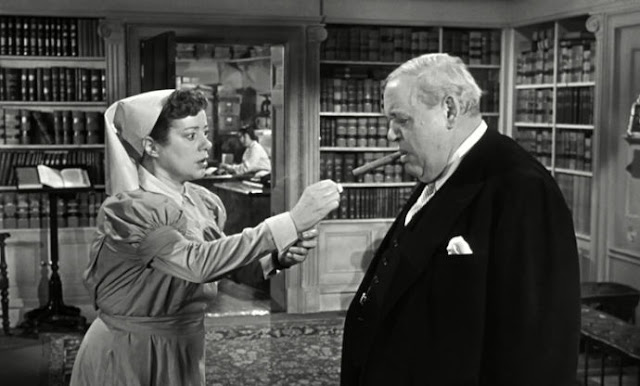 |
| Elsa Lanchester as Nurse Plimsoll with Laughton as Sir Wilfrid |
Laughton's own wife Elsa Lanchester is cast as the chatty and attentive nurse, Miss Plimsoll, a character created by the screenwriters specifically for the film. The relationship between these two characters acts as the film's subplot and comic relief, evolving from antagonism into an almost affectionate understanding.
Miss Plimsoll seems to be a frustrated spinster who treats her awkward patient like a surrogate husband or child. In one scene she chatters about the problem of foreign wives (like Christine Vole), saying that the government should do something about them. She favours an embargo and talks of the need to take care of "our own surplus" - the implication being that she means of spinsters like herself.
Ageing heartthrob Tyrone Power is less obvious casting as Leonard Vole, a former RAF sergeant and mechanic, who we assume is meant to be British, despite his American accent. Unless he's meant to be one of those faux Canadians who often turned up in British war films of this era. Maybe it would have made more sense to make his character a G.I. who stayed on after the war.
The murder victim is a widow, Mrs French (Norma Varden). Vole first sees her when she is trying on hats in a ladies' clothing shop and he encourages her to buy a particularly flamboyant example. They next meet in the local cinema, where a western about Jesse James is showing. Which is almost certainly an in-joke, as Tyrone Power had starred in the film Jesse James, alongside Henry Fonda, in 1939. In an ironic touch, it's the hat that he earlier insisted she buy that causes them to meet again, since it's now obscuring his view of the cinema screen.
 |
| Leonard Vole (Tyrone Power) with Christine in post-war Hamburg |
Tyrone Power is not ideal casting, in terms of age or nationality, and he does overact in his cross-examination scenes, when Torin Thatcher's prosecuting counsel is trying to break him down. But he is able to display enough likeability and ambiguity for his character, given that the audience must remain unsure of his guilt or innocence until the end.
As Vole's wife Christine is a German actress and cabaret singer and this is Hollywood in the 1950s, she is almost inevitably played by Marlene Dietrich. As Christine Vole, Dietrich plays a character at least as ambiguous as Power's. Either she is using Leonard Vole or he is using her. And she appears to be either lying to save him or lying to frame him. Who can say which? As a result, the Sphinx-like Dietrich has to remain enigmatic throughout, although she carries off her most difficult scene well.
The flashback sequence, when Vole describes how he met his wife in Germany in 1945, takes us back to the territory of Wilder's 1948 satire A Foreign Affair, which also starred Dietrich. Vole meets Christine when she is performing in a cellar club in Hamburg, packed with rowdy servicemen. There she is singing a song with the memorable chorus "I've got kippers and kippers galore, that have never been tasted before!"
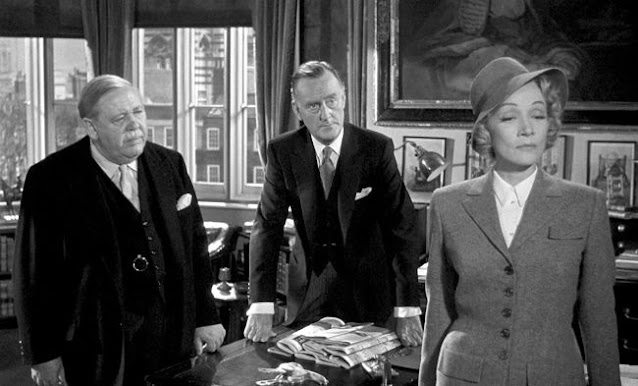 |
| Robarts (Laughton), Brogan-Moore (John Williams) and Christine Vole (Dietrich) |
When the club is trashed in a brawl and the Military Police arrive, Vole offers her some coffee and they go back to her place. Presumably, he is hoping to sample her kippers. Her "place" turns out to just be a dilapidated back room in the club itself. Christine rewards him with a kiss for each spoonful of coffee that he gives her, in a scene suggesting that their relationship has been transactional from the very beginning.
Apart from some exterior location filming in England, Witness for the Prosecution was filmed entirely in the studio in Hollywood. The exterior shots of the Old Bailey in London show ladders and scaffolding around the famous statue of Lady Justice. This might be taken to be a sly suggestion that the justice system is in need of some re-constructive work, or maybe it represents the ailing, but still fighting Sir Wilfrid. Then again, maybe there was just some building work being carried out at the time.
Despite having no British personnel (other than original author Agatha Christie) among the film's principal creative team and only one British name in its trio of stars, Witness for the Prosecution feels remarkably British for a 1950s American film.
This is partly because the supporting cast includes plenty of British expats in Hollywood, including Elsa Lanchester as Miss Plimsoll, Henry Daniell as Vole's solicitor Mayhew, and a more recent import, Torin Thatcher as Robarts' courtroom adversary. Thatcher is well used as the intimidating and pugnacious prosecuting counsel, in what is easily one of his best film roles. Francis Compton is authoritative, but humorous and sympathetic, as the judge presiding over the trial and the always urbane John Williams (of Hitchcock's Dial M for Murder and To Catch a Thief) plays Brogan-Moore, the other barrister in Sir Wilfrid's chambers, who is originally set to take on Vole's case.
 |
| Una O'Connor as Mrs French's housekeeper Janet |
There's also an almost scene-stealing turn by the tiny, birdlike Irish actress Una O'Connor (here with a Scots accent), as the victim's wonderfully tart live-in maid and cook. She has taken an instant dislike to Vole and seems to be even less forgiving now that she believes him to have murdered her mistress. Or is it simply because he has inherited the money she was expecting for herself?
Murderers faced the death penalty in Britain at this time, something that inevitably adds greater weight to the film's drama and a greater impetus to Robarts' efforts to clear Leonard Vole's name. The unpleasant business of murder is handled in the best Agatha Christie style though, the film being totally bloodless and with no unpleasant details provided about the murder or the victim's injuries.The film does have something of a twist, as is sometimes the case with Agatha Christie. Its distributor, United Artists, ensured that a statement was added to the film asking audiences not to tell anyone the ending. Like many other stories of this type, there is inevitably some degree of contrivance in the plot. The big twist itself relies on the kind of trickery that works much better with the distance of the theatre stage, but the film just about gets away with it.
Witness for the Prosecution was well received at the time and was one of the only adaptations of her work that managed to win the approval of Agatha Christie herself. The film was rewarded with Academy Award nominations for best picture, director, editing, sound recording, and for Charles Laughton as best actor and his wife Elsa Lanchester as best supporting actress. Although, oddly enough, it wasn't nominated for the best adapted screenplay award. The film was also nominated for other awards including five Golden Globes (with Lanchester winning best supporting actress) and a British Academy Award nod for Laughton.
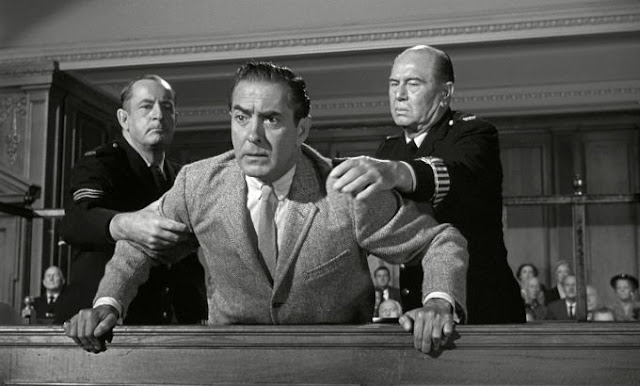 |
| Leonard Vole (Tyrone Power) in the dock at the Old Bailey |
Of the three stars, it's Laughton who dominates proceedings and generally outclasses his co-stars, so it's not entirely surprising that he was singled out for awards. It was also Laughton who appeared briefly as himself in the film's original trailer, speaking directly to the audience and defying them to guess the story's ending.
The film serves as a valedictory of sorts for its stars, it being effectively the last major leading role for all three. After a budget Italian-made war drama, Sotto dieci bandiere ("Under Ten Flags") in 1960, Laughton appeared in prominent supporting roles in Spartacus (1960) for Stanley Kubrick and Advise and Consent (1962) for Otto Preminger, before his death in 1962.
Both Tyrone Power and Marlene Dietrich were a little too old for their roles in Witness for the Prosecution (he was in his early forties, she in her late fifties), and the unhealthy Power looked his age. The film was his last, as he died young aged 44, suffering a heart attack while making his next film, Solomon and Sheba, in Madrid in 1958.
Marlene Dietrich had a couple of prominent supporting roles after this, in Touch of Evil in 1958 for Orson Welles, and Judgment at Nuremberg in 1961 for Stanley Kramer, but after that she mostly retired from the screen. Although Dietrich seems to have anticipated an Oscar nomination for Witness for the Prosecution, it wasn't to be. Una O'Connor, who played Mrs French's housekeeper Janet, the same part she had taken in the Broadway production of the play, also made this her final film, retiring afterwards.
A television remake of Witness for the Prosecution appeared 25 years later in 1982, based on the script for this film, rather than on the original play or short story. The TV version boasted a starry cast, with Ralph Richardson, Diana Rigg and Beau Bridges in the Laughton, Dietrich and Power roles, and with Deborah Kerr cast as the nurse Miss Plimsoll.
Cast Tyrone Power (Leonard Vole), Marlene Dietrich (Christine Vole), Charles Laughton (Sir Wilfrid Robarts), Elsa Lanchester (Miss Plimsoll), John Williams (Brogan-Moore), Henry Daniell (Mayhew), Ian Wolfe (Carter), Torin Thatcher (Mr Myers), Norma Varden (Mrs Emily Jane French), Una O'Connor (Janet McKenzie), Francis Compton (Judge), Philip Tonge (Inspector Hearne), Ruta Lee (Diana)
Producer Arthur Hornblow Jr Cinematography Russell Harlan Art director Alexander Trauner Editor Daniel Mandell Music Matty Malneck, arranged by Leonid Rabb, conducted by Ernest Gold Presented by Edward Small
Production company Theme Pictures Distributor United Artists

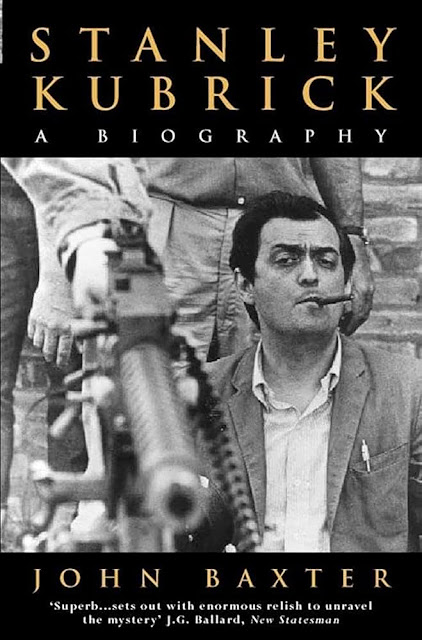
Finally you're writing about a film again that I know about! :)
ReplyDeleteIt's such a great movie and eminently re-watchable. I've read Christie's story, it's good, but I think Wilder improved on the source material, just as Hitchcock had improved on The 39 Steps years earlier.
Charles Laughton is in top form here, as is the rest of the cast.
I actually like Tyrone Power very much in this role. A change of pace for him and I think not a bad one. He had always wanted to be more than the gorgeous swashbuckler, so I think - had he lived - he could have reinvented himself as a good character actor. Errol Flynn had the same problem. Both starred in The Sun Also Rises where they shed their former images, to good effect.
I don't mind Power's American accent. I think it's better than trying to put on dodgy fake accent which so often doesn't work. Robert Taylor doesn't go in for a Scottish accent either in Waterloo Bridge, thankfully. We just have to accept him as an upper-class Scotsman. We don't, but it's still a great movie.
Joan Bennett's Cockney accent in Man Hunt was ill-advised, for example.
Both Leonard's and Christine's ambiguity work to the film's advantage. I always found their first meeting intriguing. As you rightly say, their relationship has been transactional from the very beginning. Despite the Production Code, it's blatantly obvious that Christine is more than just a singer in a rowdy nightclub.
The ending is a doozy.
It's one of those mystery films, like Green for Danger, that are so entertaining that it doesn't really matter if you already know the outcome. The first time I saw it I think I could guess the twist. The twist is compromised a bit by the transfer to film. This is what I meant when I referred to the distance of the theatre stage. But it doesn't matter much, even if you've seen it before, because it's the journey there that's so entertaining. Laughton is particularly great, this and Hobson's Choice's are probably my favourite performances of his.
DeleteNot bothering with accents was quite common at the time. If it was made later they probably would have inserted a line about him being an American. American and English accents have become the sort of default because they are by far the most common in English language films. So if you hear an ancient Roman with an American accent then you don't really think about it, but if they have, say, an Australian one then it sounds weird. Even though they're obviously both wrong. I have to say, I do like to hear an actor do an accent. It makes you feel like they're trying. Plus you get the bonus that it might go hilariously wrong.
I actually saw the 1980s remake first (it's pretty good: https://www.youtube.com/watch?v=pjEIsGauX04 ). Same script, similar camera set-ups, and, surprise, surprise, some improvements in the casting. Ralph Richardson is as good as Laughton, but Diana Rigg is better than Dietrich, and Beau Bridges is better than Power.
ReplyDeleteAnyhow, I love, love this movie. I believe Christie said that the movie worked better than the stage play. But agree with you about how the twist is ruined by the proximity of the camera (Sleuth (1972) has the exact same problem).
I read that Ben Affleck is working on a remake. No, thanks.
Sleuth is the one I thought of as well. Even as a child, I wasn't fooled at all by that.
DeleteThe remake looks interesting. I have actually seen it, but not since I was a child. It might make for an interesting comparison. I can imagine that a British actress could pull off the twist more plausibly.
Sleuth fooled me because (SPOILER ALERT) … I overthought the whole thing. I thought the detective was the brother of the Olivier's wife's lover, hence Caine playing both characters. LOL! I was a kid with a vivid imagination. ;)
DeleteI've seen a film where something similar to that happens. A character is killed in an accident and they quietly dispose of his body. But later, in a shock moment, he suddenly turns up on their doorstep again. But it turns out that it's not the same man, it's his twin brother!
Delete